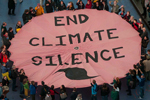
Hurricane Sandy storm surge on the New Jersey shore. Photo by: Master Sgt. Mark C. Olsen/U.S. Air Force/New Jersey National Guard.
At a news conference today, a question by New York Times reporter Mark Landler pushed President Obama to speak at some length about climate change. In his answer, Obama re-iterated his acceptance of climate science and discussed how progress on tackling climate change might proceed in his second term, though he also noted that he wouldn’t put action on the climate ahead of the economy. President Obama made a small reference to climate change in his victory speech following his historic re-election last Tuesday, but his answer today was the most the president has talked about the issue at any length since at least Hurricane Sandy.
“We can’t attribute any particular weather event to climate change,” Obama said, echoing what climatologists have been saying for years. “What we do know is the temperature around the globe is increasing faster than was predicted even 10 years ago. We do know that the Arctic ice cap is melting faster than was predicted even five years ago. We do know that there have been an extraordinarily large number of severe weather events here in North America, but also around the globe.”
This summer Arctic sea ice extent fell to a new record low, shocking scientists by how quickly the Arctic seasonal ice was vanishing. The ice melted to just 3.4 million square kilometers (1.32 million square miles), beating the previous record—set in 2007—by 18 percent. The Arctic sea ice nadir is now about half as small as it was in 1980.
In addition, this year alone the U.S. has suffered a barrage of record heatwaves and fires, while still facing a crippling drought across much of the country. Meanwhile a number of recent studies have found increasingly confident links between rising temperatures and a global rise both in number and severity of droughts, heatwaves, and floods.
In his answer Obama touted a number of policies he pushed through in his first term—such as increasing fuel efficiency in vehicles and supporting clean energy—though there was no mention of the climate legislation that he supported which failed to pass the Senate.
“But we haven’t done as much as we need to,” he said. “So what I’m going to be doing over the next several weeks, next several months, is having a conversation, a wide-ranging conversation with scientists, engineers and elected officials to find out what more can we do to make short-term progress in reducing carbons and […] what realistically can we do long term to make sure that this is not something we’re passing on to future generations that’s going to be very expensive and very painful to deal with.”
Still, Obama did not go so far as to say that cutting greenhouse gas emissions would take precedence over economic growth or jobs.
“There’s no doubt that for us to take on climate change in a serious way would involve making some tough political choices, and you know, understandably, I think the American people right now have been so focused and will continue to be focused on our economy and jobs and growth that, you know, if the message is somehow we’re going to ignore jobs and growth simply to address climate change, I don’t think anybody’s going to go for that. I won’t go for that,” he said. “If, on the other hand, we can shape an agenda that says we can create jobs, advance growth and make a serious dent in climate change and be an international leader, I think that’s something that the American people would support.”
An annual report by the International Energy Agency (IEA) released this week noted that if the world is to stick to its pledge of keeping global temperatures from rising above 2 degrees Celsius (3.6 degrees Fahrenheit) than “no more than one-third of proven reserves of fossil fuels can be consumed prior to 2050.” The IEA’s estimate, however, is based on only a 50 percent likelihood of avoiding a planet that jumps the 2 degrees Celsius mark. Scientists have long warned that jumping the 2 degrees Celsius mark could put the globe on the road to catastrophic climate change; to date the Earth has warmed t 0.8 degrees Celsius (1.44 degrees Fahrenheit) since the early Twentieth Century. Some scientists have warned that even the 2 degrees Celsius goal is simply too high.
Obama referred to tackling climate change as “hard” but “important.”
“You know, one of the things that we don’t always factor in are the costs involved in these natural disasters. We just put them off as something that’s unconnected to our behavior right now, and I think what, based on the evidence, we’re seeing is that what we do now is going to have an impact and a cost down the road if we don’t do something about it,” he said.
There was so little mention of climate change during the 2012 U.S. elections by the presidential candidates and the media that environmental activists had begun to declare that a “climate silence” had swept over the U.S. That changed when Hurricane Sandy brought 14 foot swells of water over the New Jersey shoreline and flooded lower Manhattan on October 29th, causing at least $20 billion in damages across the U.S. East Coast. The impact of climate change on hurricanes is by no means fully understood and more research is needed. However, scientists generally agree that climate change is increasing the severity of hurricanes—if not the number—through rising sea levels, more moisture in the atmosphere (a hotter world means increased evaporation), and greater intensity.

Sea ice extent hit a record low on August 26th, and then continued to decline another 700,000 square kilometers. Image courtesy of the U.S. National Snow and Ice Data Center (NSIDC).
Related articles
Day after Obama re-elected, group plans massive march over Keystone Pipeline and climate change
(11/07/2012) Hours after President Obama’s historic re-election, climate group 350.org announced a massive rally to apply pressure on the administration to reject the Keystone Pipeline, which would bring tar sands from Alberta to an international market. In 2011 the group and its partners carried out massive civil disobedience action, resulting in over 1,000 arrests, and a rally 12,000-strong that literally encircled the White House. The pressure, which was also brought to Obama campaign offices around the country, helped spur the Obama Administration to suspend the pipeline.
It’s not just Sandy: U.S. hit by record droughts, fires, and heatwaves in 2012

(11/05/2012) As the devastation wrought by Hurricane Sandy—killing over 100 people and producing upwards of $50 billion in damage along the U.S. East Coast—has reignited a long-dormant conversation on climate change in the media, it’s important to note that this is not the only weird and wild weather the U.S. has seen this year. In fact, 2012 has been a year of record-breaking weather across the U.S.: the worst drought in decades, unprecedented heatwaves, and monster forest fires. While climatologists have long stated that it is not yet possible to blame a single extreme weather event on climate change, research is showing that rising temperatures are very likely increasing the chances of extreme weather events and worsening them when they occur.
Hours before Hurricane Sandy hit, activists protested climate inaction in Times Square

(10/30/2012) On Sunday, as Hurricane Sandy roared towards the coast of the Eastern U.S., activists took to the streets in New York City to highlight the issue of climate change. Activists organized by 350.org unfurled a huge parachute in Times Square with the words, “End Climate Silence,” a message meant to call attention to the fact that there has been almost zero mention of climate change during the presidential campaign, including not a single reference to the issue in the four presidential debates.
How climate change may be worsening Hurricane Sandy

(10/29/2012) While scientists are still debating some fundamental questions regarding hurricanes and climate change (such as: will climate change cause more or less hurricanes?), there’s no debating that a monster hurricane is now imperiling the U.S. East Coast. A few connections between a warmer world and Hurricane Sandy can certainly be made, however: rising sea levels are likely to worsen storm surges; warmer waters bring more rain to increase flooding; and hotter temperatures may allow the hurricane to push both seasonal and geographic boundaries.
Lack of climate change in presidential debates part of larger trend
(10/23/2012) The final presidential debate between President Barack Obama and Governor Mitt Romney, focusing on foreign policy, ended like all the others: without a mention of climate change or its likely impacts on Americans, from rising sea levels to worsening extreme weather to the threat of instability abroad. While environmental groups have kicked-off a campaign to target this “climate silence,” the lack of discussion on climate change is a part of a larger trend in the U.S. where media coverage of the issue has declined even as scientists argue that impacts are increasing.
Will we need to pull carbon out of the atmosphere to save ourselves?

(10/17/2012) This year saw the Arctic sea ice extent fall to a new and shocking low, while the U.S. experienced it warmest month ever on record (July), beating even Dust Bowl temperatures. Meanwhile, a flood of new research has convincingly connected a rise in extreme weather events, especially droughts and heatwaves, to global climate change, and a recent report by the DARA Group and Climate Vulnerability Forum finds that climate change contributes to around 400,000 deaths a year and costs the world 1.6 percent of its GDP, or $1.2 trillion. All this and global temperatures have only risen about 0.8 degrees Celsius (1.44 degrees Fahrenheit) since the early Twentieth Century. Scientists predict that temperatures could rise between 1.1 degrees Celsius (2 degrees Fahrenheit) to a staggering 6.4 degrees Celsius (11.5 degrees Fahrenheit) by the end of the century.
Norway to double carbon tax on oil industry for climate change programs
(10/15/2012) Beginning next year, Norway will nearly double the carbon tax on its domestic oil industry to help set up a $1 billion climate change fund for programs in developing nations among other green projects. The Scandinavian nation is the world’s 13 largest oil producer and third biggest oil exporter, yet has been one of the most active champions of funding climate change projects.
Over 70 percent of Americans: climate change worsening extreme weather
(10/10/2012) According to a new poll, 74 percent of Americans agree that climate change is impacting weather in the U.S., including 73 percent who agreed, strongly or somewhat, that climate change had exacerbated record high temperatures over the summer. The findings mean that a large majority of Americans agree with climatologists who in recent years have found increasingly strong evidence that climate change has both increased and worsened extreme weather events.